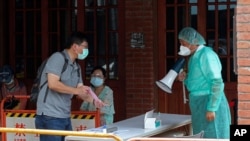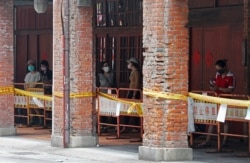Taiwan, which captured world attention last year for going more than 200 consecutive days without a local COVID-19 case, is shutting things down for the first time to contain its worst coronavirus outbreak since the global pandemic began.
The government’s Central Epidemic Command Center announced more than 1,200 cases from Friday through Wednesday including a record single-day count of 333 cases. Command center officials say infected cargo pilots introduced COVID-19 in mid-April followed by spread among “hostess bars” in a densely populated quarter of Taipei. More than 150 of the 260 cases reported Tuesday were linked to that district. Taipei’s mayor has targeted migrant workers, often helps staff the bars, for virus testing.
“A lot of spread is through the underground, two vectors, one of which is underground industries, which was my nightmare, and the second one was of course potential illegals or people who came in without checking,” said Sean Su, an independent political analyst in Taipei.
On Saturday, the command center ordered all public spaces, including cinemas, libraries and recreation centers, to close through May 28. Most schools had closed or moved classes online by Tuesday. Shops, eateries and offices can stay open if they follow epidemic prevention rules such as social distancing. Streets that are usually packed with pedestrians, scooters and vehicular noise have taken on the quiet aura of a holiday.
If daily caseloads remain above 100 per day, the government will eventually consider a hard lockdown where everyone must stay at home except to do essential business.
Though it’s still legal to go outside, many people used social media groups over the weekend to urge relatives, colleagues and fellow school parents to stay home.
“We’ve seen a lot of what could be called informal networks,” said Wu Chia-yi, associate professor in the National Taiwan University College of Medicine’s nursing faculty. “They’re actually playing the role of reminders and encouragement, and the effectiveness isn’t bad. This networking is a way for everyone to remind one another.”
About the only place sure to draw crowds are supermarkets. Panic buying resurfaced over the weekend for the first time since early 2020, when Taiwan reported lower levels of local caseloads. Shelves had emptied of toilet paper, face masks, disinfectant alcohol and some packaged foods by Monday morning.
Taiwan, one of the last developed and populous places in the world to experience a big COVID-19 spike, dodged the disease last year through quarantines, contact tracing and strict border controls.
More than 5 million doses of vaccines from U.S. pharmaceutical company Moderna are due to reach Taiwan this month, the command center said in April.
Taiwanese still largely trust the government's judgment on how to contain the virus and determine the severity of shutdowns despite inevitable losses of business in the service sector, Su said.
“Our health minister is working very hard, and he has told us all along to wear face masks,” said Yang Jie, 69, who went out walking Monday in suburban Taipei with her 3-year-old grandson instead of sending him to a daycare center that would place multiple children in one room.
But people will grow angrier as the threat of COVID-19 and the inconveniences of closures, said Chen Yi-fan, an assistant diplomacy professor at Tamkang University in Taiwan.
“We are forced to take care of children because the schools are all shut down right now, so a lot of working parents aren’t getting compensation from the government, and instead they have to beg their supervisors to let them stay at home,” Chen said.





